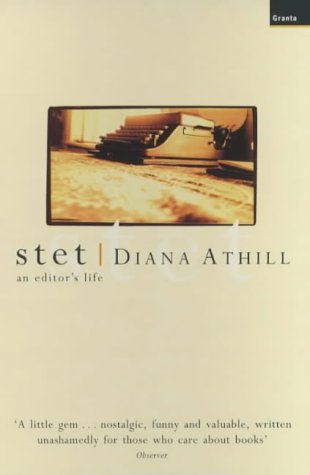Book - Stet

| [ US | UK ] |
Stet
by Diana Athill
Rating: ★★★★☆
Synopsis: Diana Athill has had a most interesting and varied life, and the title she has chosen for her autobiography is proofreaders’ jargon for “Let it stand”. In other words: no regrets. It’s a fine title. As a grand old lady of British publishing, Athill can look back on 50 years of work with the great Andre Deutsch, and many close-working relationships with writers such as VS Naipaul, Jean Rhys and Brian Moore. One of the distinguishing features of Athill’s book is its honesty, both with her colleagues and with herself. (She has already been scolded by another reviewer for revealing that she had an affair with Andre Deutsch, and once kissed one of her authors). Her portrait of Brian Moore is not always very flattering, and as for Naipaul, it is with a sigh of relief that she admits that they are no longer friends, and she is free to admire him simply as a writer, if not as a man. And there is a whole chapter devoted to a forgotten and tragic character called Alfred Chester, whom Athill edited for a while. He ended up in Israel living virtually as a hermit, until he died of heart failure brought on by drink and drugs. It was all “horribly sad”. The final sense, however, is one of tremendous energy and enthusiasm for all things bookish, and one can relish the grand, throwaway manner. Of her early girlhood, she recalls simply, “Reading was what one did indoors, as riding was what one did out of doors”.
I currently work in publishing, so perhaps this is naturally of more interest to me; however, I really think the book would appeal to any person interested in books, publishing or creative people. The book is in two halves. The first is Athill’s own career and memories of Andre Deutsch, the publishing house where she worked. The second are her memories of some authors she worked with over the years and an some insight into her relationship with them and their publishing career. While perhaps too modest about her skills as an editor, it makes for interesting reading.
Many places in the book I paused to think how amazingly relevant some of it was to today’s publishing world. The same economic and social forces that made Deutsch become less profitable are still happening now, the effects even more painful to publishers of excellent, but perhaps less commercial books.
Well worth a read.
No slideshow images defined in front matter for this page.

Comments
Add a comment